Web Focus: The Role of the Web Editor
The national workshops on Institutional Web Management held at the University of Newcastle in September 1998 [1] and King’s College London in July 1997 [2] attracted a variety of people involved in running institutional web services. Damon Querry, the WWW Trainer & Enabler at Newcastle University ran a discussion group session at the KCL workshop on The Trials and Tribulations of a Web Editor [3]. That session, together with informal discussions at the workshops and on mailing lists such as the website-info-mgt Mailbase list have shown that there is much interest in the role and responsibilities of such posts. This article attempts to explore these issues.
Historical Background
In response to a message sent on 23rd October 1998 [4] to the website-info-mgt list asking for list members’ recollections of the first web posts advertised by UK universities, the following details emerged.
A Network Information Support post at Nottingham University was advertised in January 1994. This was claimed to be the first of its type, although a Networked Information Services Advisor post at Brighton University was advertised (in the Library Association Record Vacancies Supplement) in December 1993.
Both of these posts, however, provided support for finding information on the Internet. Sussex University appointed a CWIS Editor in January 1994, although this was to support a Gopher service. Other universities, such as Cranfield and Leeds were running institutional web services in 1994, but this work was carried out by existing staff who had other responsibilities.
Further investigation revealed additional information on web editorial posts.
- The post of CWIS Editor was created by University of Edinburgh in 1992⁄93.
- The University of Nottingham produced a job description for a Network Information Systems Officer in July 1995. The post-holder, who would be based in the Computing Centre, would manage the University’s web service.
- Oxford Brookes University advertised for an Internet Publications Officer in summer 1995. This was a one-year contract, jointly based in Marketing & Communications and the Computing Service.
- The University of the West of England (UWE) advertised for a Library Internet Adviser around November 1995. The post-holder would "play a leading role in enhancing the quality of the University’s corporate information on the Internet".
- In autumn 1995 the University of Birmingham advertised for an Electronic Publication Developer. The post-holder, based in the Public Affairs Office, would be responsible for making the Postgraduate Prospectus and related publications available on the web.
Recent Job Advertisments
A survey of web-related posts in the UK HE community which have been advertised in The Guardian has been carried out recently in order to monitor job titles, skills required and salary scales.
University Web Posts
Birkbeck College [5] advertised for a World Wide Web Editor in The Guardian originally on 11 July 1998 and re-advertised on 10 October 1998. The advertisment was available on the jobs.ac.uk service on 23 October 1998. This is a new post, based in the Central Computing Services. The post-holder "should possess a degree or equivalent qualification and have a minimum of two years’ experience of developing and maintaining a corporate Web site. Up-to-date technical knowledge and experience of Web authoring tools, graphics and design for the effective delivery of Web content are essential requirements." This was a permanent post. Salary for this post was on scale 2-3 (£20,409-£31,182, inclusive of London Allowance).
The University of Leeds [6] advertised for a Computer Officer (WWW Development) in The Guardian in October 1998. The job advertisment was available on the Leeds University Computing Service web site [7], together with further details about the post [8]. This is a technical post in the University Computing Service requiring expertise in HTML, CGI, etc. It is a permanent post. Salary for this post is on scale 2-3 (£18,275-£29,048).
Roehampton Institute [9] advertised for a Web Development Officer and a Web Editor in The Guardian on 10 October 1998. This post is based in the Institute’s Information Services department. The Web Development Officer is expected to have experience of web authoring tools (MS Front Page or PageMill), web programming expertise (JavaScript and Perl) and preferably knowledge of web database integration. The Web Editor post required knowledge of HTML authoring tools and would be responsible for developing the Institute’s Intranet. Both of these posts were fixed term, the former lasting until 31 July 1999 and the latter for a period of 1 year. The Web Development Officer post was advertised on a salary scale of £20,471-£23,416 and the Web Editor on a scale of £14,928-£18,177.
The University of Plymouth [10] advertised for a Senior Computing Officer (WWW and Electronic Information Development) in The Guardian in August 1998. This post, in the Academic and Information Services department, requires someone with a Computer Science or equivalent degree to play a lead role in the installation, configuration and development of the University’s central Web and Electronic Information Service. The post was advertised on the salary scale £18,374-£22,407.
Public Sector Web Posts
Details of public sector web posts advertised recently are given below in order to make a comparison with the Higher Education community.
Guy’s & St Thomas’ Hospital Trust [11] advertised for a Web Master in The Guardian in September 1998. The advert stated that the Web Master "with creativity and structure will drive/forge the development of the Web services to ensure full use of this innovative communication tool throughout the Trust and ensure its interactions with the NHS and general public. This role will require HTML and training / selling skills." Essential experiences required included demonstrable Web Master expertise, web training and HTML authoring tools. Experience of Java and ActiveX were desirable. The post was advertised on a salary of around £22-24K.
Bristol City Council [12] advertised for a Coordinator - Electronic Information in The Guardian on 17 October 1998. This appeared to be a web editor’s post, with responsibility for content of the Council’s website. This 3 year fixed term post was advertised on a salary scale of £23,199-£25,245.
The Commercial Perspective
In October 1998 the US-based Internet World [13] magazine conducted an email survey of webmasters working for Fortune 500 companies. A total of 65 replies were received. The results of the survey [14] indicated that webmasters (a term liked by over half of the respondents) tended to work in teams, with the most common Web team size is between two and five people, although over 15% work in Web teams with over 50 members of staff! Only 29% have annual salaries of less than $55,000 (£32,860), with 20% receiving over $95,000 (£56,757).
The Web Editor’s View
On 19th October 1998 I sent a message [15] to the website-info-mgt list asking for people’s views on what it’s like being a web editor. A number of personal replies were received, including the following.
Colin Work, University of Southampton wrote that the job of a web editor includes:
- Information management: correlating information from a wide range of sources into a coherent whole; ensuring this information provides the desired view of the institution; providing an effective means of locating specific information; commissioning material where there is an information deficiency.
- Quality control: ensuring accuracy, maintaining house style; advising (if not determining) on editorial policy and implementing that policy; determining appropriate metrics and supplying evaluative data to management.
- Author support: provision of tools, training, advice to facilitate HTML authoring.
- Web Design: creation and implementation of the corporate Web look-and-feel.
- Software skills: HTML, Perl, CGI etc. - i.e. the technical ability to carry out the above.
- System management: care and feeding of servers.
Colin listed these in order of importance to the editorial role - in smaller organisations, the "editor" may be responsible for all six roles. In larger organisations, the latter items may be assigned to specialists, or contracted out - the first item may, in a large organisation, be the prime function of the Web editor, though the editor should then have a managerial view over the other functions. Colin regards "information" as the primary driver, all other functions being subservient to the effective provision of information.
Colin feels that the following skills are needed, in the order given:
- formal training in information management/science/librarianship is invaluable.
- good people skills.
- people/resource management skills.
- writing ability.
- graphic design - the web is primarily a visual medium.
- technical skills (programming, etc.) - this is quite important, but perhaps more quickly and easily acquired than the above.
Colin doubts there is a real future in being able to "twiddle" HTML, etc. However if the focus is on the information management aspect divorced from technology, this has got to be the growth area. Every company, organisation etc. has an information management problem whether or not they realise it. As the actual value of information as a commodity is increasingly realised, people capable of addressing these problems will be in high demand.
Maurice Crockard of Anglia Polytechnic University is the web coordinator who also has responsibility for the University Information Strategy. Maurice has intermediate level HTML and Javascript skills and relies heavily on technical support from his computing support staff. Anglia Polytechnic University has a web-team, comprising two Computing staff plus Maurice, to read mail responses and information requests on behalf of the University web site users. The two Computing staff have many other tasks not related to the web site.
Maurice’s role is to establish a consistency of approach down to the first page of any academic or administrative unit. He has a group of "mini web coordinators" at this level who provide content and are expected to update their own central web pages. This is about 30-40 staff, some of whom have little technical ability. Part of Maurice’s role is in organising training for these staff and bringing them together for workshops to discuss problems and good practices.
Kriss Fearon, University of York, has the following responsibilities:
- Keeping an overview of the University’s web presence
- Maintenance of information for external audiences, including prospective students
- Print production of the graduate and undergraduate prospectuses production and maintenance of guidelines on best practice, visual identity and standards
- Liaising with (and advising and supporting) other members of staff on web issues
- Promoting YorkWeb
Kriss also provides limited technical support for official providers with relatively straightforward problems, is secretary to Web Steering Group, runs various projects as required (e.g. a joint project with an associated college, York CFHE, where the University of York provided web training to them and they designed York’s visiting students’ prospectus). Kriss runs a training course on promoting web pages and is planning to work with various departments on the marketing side - e.g. helping the conference office write a web marketing plan.
In York University there is a webmaster based in the Computing Service who is responsible for running the web server and support software. Another person within the Computing Service is responsible for Netscape support and HTML training and is also running a web-database interface JISC-funded project. Kriss is responsible for the administrative side, Secretary of Web Steering Group and a number of other admin-related tasks.
Skills which Kriss feels are needed in her job include:
- An understanding of the traditional print production process is very helpful because it gives a good context and framework for running other projects and of the work and familiarity with the stages of work involved.
- An understanding of the difficulties posed for staff working within the institution taking on additional work with which they are unfamiliar.
- General political sensitivity! Kriss has to work with all members of staff involved in web work and knowing what’s going on in the background is useful for ‘pitching’ ideas appropriately to different groups of people.
- The usual technical skills. HTML authoring expertise is needed, but not programming skills (although this may be different in other institutions).
- Organisational skills and a grasp of the administrative structure of the institution are also important.
Andrew Cormack, Cardiff University, feels that there are two roles: webmaster and web editor. The Webmaster is the technical person who deals with things from the silicon up to the software; web editor, like any other kind of editor, deals with content. CGI scripts muddy the distinction somewhat, of course! The simplistic, Unix-based, division is that webmaster needs root access and web editor doesn’t.
Depending on the size of the organisation, the editor may have mostly managing and collating job, or may be the person who generates most of the pages. So you need people skills, some ability with graphics and design (unless this is contracted out), English (Welsh?), HTML and other web languages. Also depending on the size of the site, you could have anything from one person doing both jobs to a committee for each of them. Under Andrew’s terminology, Cardiff University has rather less than half a webmaster and about a dozen web editors!
Linda Newall from the University of Central England, gave a departmental view. Linda is the Faculty Web Coordinator for Faculty of Computing and Information Studies at UCE. Her job includes developing strategies for the Faculty (Intranet, Internet, teaching and learning managing the web developments, team building, writing web pages, learning new technologies, graphic design etc.). The work includes web author, graphic designer, manager, database manager which requires a range of skills including web design, project management, facilitation, report writing, authoring content, data management, information management, database management, server management, etc.
Sarah Bristow, Sheffield Hallam University, who has spent most of the last 3 years being the web person for the Learning Centre at Sheffield Hallam University (i.e. not the person in overall charge of the whole university web service) was also willing to give her views from a departmental perspective.
The job entails creating pages; editing those provided by others to conform with certain ‘house styles’; soliciting new pages from all interested parties and overall design and maintenance of the site concerned (about 350-400 pages currently). Whilst writing/understanding HTML is a major constituent of the post, Sarah often has to draw on her detailed knowledge of the department she represents, particularly when it comes to persuading colleagues to provide information about their services. Most see the advantage of being able to advertise the department’s services and expertise on the web and have happily jumped on the Internet bandwagon, although a few have been more hesitant in exploiting this media, so diplomacy and negotiating skills occasionally have to come into play.
Resources For The Web Editor
A number of organisations have been set up to provide support for Web Editors. A brief review of a number of organisations, taken from Yahoo [16] is given below.
The HTML Writer’s Guild [17] (HWG) describes itself as the world’s largest international organization of Web designers with over 70,000 members in more than 130 nations worldwide. Membership is open to anyone with an interest in web authoring and a desire to improve their skills.
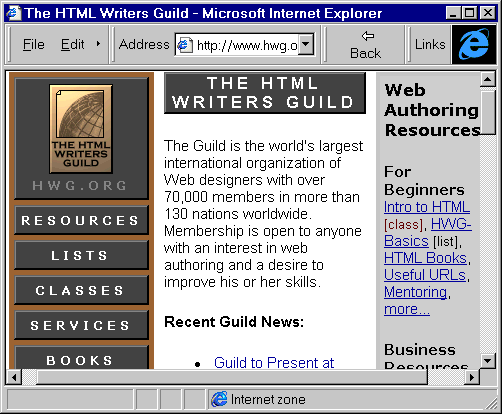
Figure 1 - The HTML Writer’s Guild Home Page
The HWG hosts a website which provides useful information for HTML authors, including a variety of FAQs (Frequently Asked Questions). Free trial membership of the group is available, which provides access to additional areas on the web site, including discussion areas. Full membership, which must be taken out after a year’s trial membership, costs $40 per year and provides access to additional web services, including a Job Listing Service.
The mission of the International Webmasters Association [18] (IWA) is to "provide education and foster professional advancement opportunities among individuals dedicated to or pursuing a Web career, and to work diligently to enhance their effectiveness, image, and professionalism as they attract and serve their clients and employers."
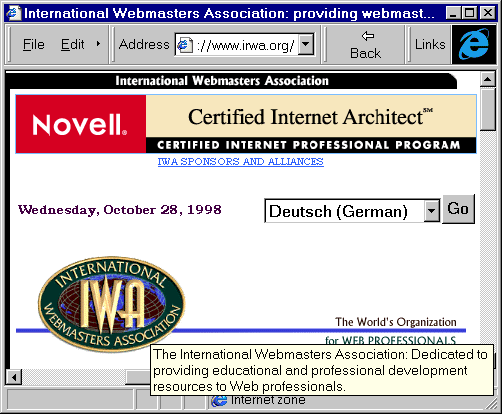
Figure 2 - The International Webmasters Association’s Home Page
The IWA appear to have a broader view of the role of a web editor. Their web site contains a variety of useful resources including a list of names and brief descriptions for those involved in web management [19] (although I suspect that not many readers of this article would call themselves a "Webmaster-Entrepreneur"). The list of job titles is used in a page describing three models for resourcing a web service [20]. The model of medium-sized Web organisation is probably nearest to a UK University, with a "Chief Web Officer" responsible for a "Systems Administrator Web Specialist", "Writer/Editor Web Specialist", "Programmer Web Specialist", "Marketing Web Specialist", "Instructor / Trainer Web Specialist" and a "Web Site Designer Web Specialist". Although these job titles are unlikely to be used, many Universities will have systems administrators, programmers and trainers (often based in the Computing Service) together with editors and designers (who may be based in administrative departments) with marketing input from a public affairs department.
The IWA run Professional Development and Certifications Programs [21] which aim to "to further the effectiveness of the services rendered to the public by the web profession and to achieve the aims and purposes of the International Webmasters Association by providing a means for recognizing those web practitioners who have attained unquestioned professional status, while providing incentive to other members to participate in a program of self-development through education as prescribed by the International Professional Development Committee (IPDC)".
The certification programme is run in conjunction with a commercial company (Sysoft). Although the cynic could argue that the certification programme is a marketing device for a training company, this criticism could be made of other certified training course which operate in other areas of IT and which members of the UK HE community have taken part in, including Sun, Microsoft and Novell certified courses. In fact Novell are now offering certified courses in web design, web development, Intranet management and Internet business strategy [22].
The Sysoft web pages [23] provide access to further details about their web training courses and a career roadmap. Unfortunately the roadmap [24] only covers the technical aspects of web management and their Corporate Webmaster course [25] covers HTML authoring and web programming and server administration, but fails to cover content management.
The IWA also produce a web magazine knbown as the "WebProfesion Ezine" [26]. This has been in existence since December 1997 and provides a variety of articles of interest to web editors, such as The Pains and Pleasures of being a Webmaster, Web Accessibility: A Moral or Standards Issue? and a series on Designing Corporate Internet Sites.
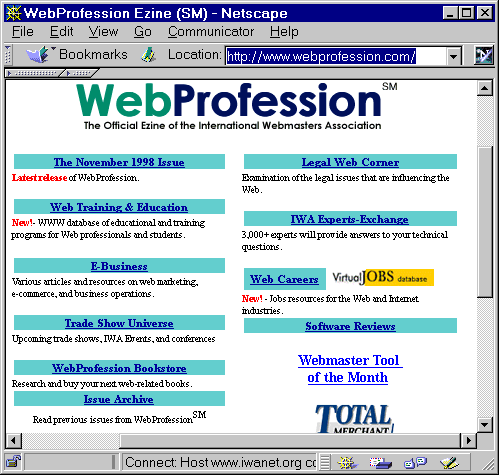
Figure 3 - WebProfesion Ezine
The aim of the World Organization of Webmasters [27] (WOW) is to:
- Foster professional standards.
- Provide for communication among all Webmasters,including corporate Webmasters in government, business, and education, independent Webmasters, and aspiring Webmasters such as students.
- Provide for education through the publishing of articles, professional papers, and the sponsoring of seminars and conferences.
- Stimulate the continued growth of the Web by providing a forum for the raising of new ideas and an effective mechanism for dialog on these issues.
- Provide security, legal and marketing whitepapers as well as an area on the latest trends in the Internet on each of those items.
WOW recognises that the degree of technical skills needed by a Webmaster varies widely, with some requiring the ability to such things as write HTML, implement firewalls, and write programming languages such as JAVA, PERL, or C, while others work on a management level, and technical staff carry out technical work. One of the purposes of WOW is to define the various types of Webmasters, and create a certification program for them.

Figure 3 - World Organization of Webmasters
The World Organization of Webmasters is currently working on a Webmaster Certification program which is due to be finalised in Autumn 1998. The National Association of Webmasters (which appears to be a US predecessor to WOW) hosted a two-day meeting on Webmaster training and certification which was reported in WOW’s newsletter [28] in January 1998. Unfortunately not a great deal of information is currently available on their website.
The International United WebMasters Association [29] (UWA) describes itself as a "bond of all WebMasters of the Internet world. It belongs to all who care to join. Membership of IUWA is only for WebMasters." Webmasters are defined as " person or persons responsible for the technical care and/or appearance of a web site with specific access to perform such tasks."
Exploring IUWA’s web site, such as its list of projects [30] with its lack of a title, pointers to dated resources and text such as "This page is currently under construction" and "Return to the home page", would appear to indicate, however, that this is not a resource for professional web managers.
The Webmaster’s Guild [32], unusually, provides only a simple mailing list service. Between 17 September and 25 October 1998 there were 86 postings to the list which included several "Unsubscribe me from this list" and requests for suggestions on HTML authoring tools. There appears to be nothing here which is not provided by the web-support Mailbase list [32].
The Webmaster’s Guild is an off-shoot of the Association of Internet Professionals (AIP) [33]. This professional organisation has been in existence since 1994. Its mission statement is "To unify, support, and represent the global community of Internet professionals." Individual membership of AIP costs $90 but it is not clear from the web site what the benefits of membership are.
Unusually, IAP has a UK chapter. The AIP London Chapter web site [34] does provide some local information, and pointers to web resources. However the information about meetings does not been appear to have been updated for some time, and it would appear that it has insufficient momentum to get started.
Other Sources of Information
CIO.com [35], a web site for information executives, host a Web Career Research Centre, [36], in addition, incidently, to research centres (which is how they call the area on their web site) on Intranets and Human Behaviour and the Web. The Web Career Research Centre provides details of job vacancies (in the US), articles about careers and related resources.
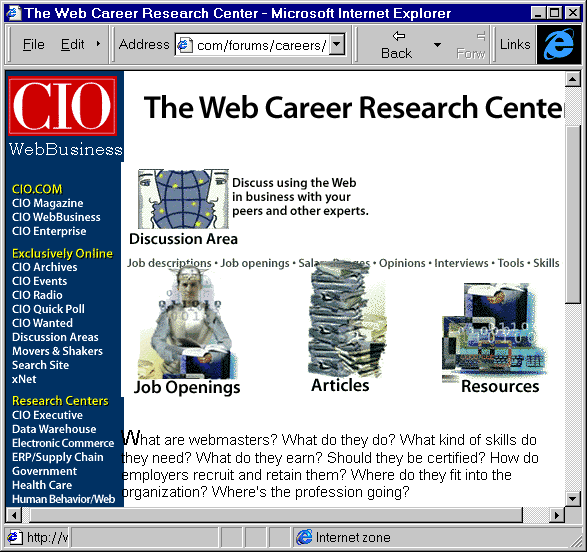
Figure 4 - CIO’s Web Career Research Centre
Computer Weekly [37], a UK weekly computer magazine, hosts an impressive job vacancies service. A search for jobs using the keyword web provided several dozen hits, including Web Designers with salaries ranging from less than £20K to up to £100K, Internet Programmers, Web Developers, and Web Consultants.
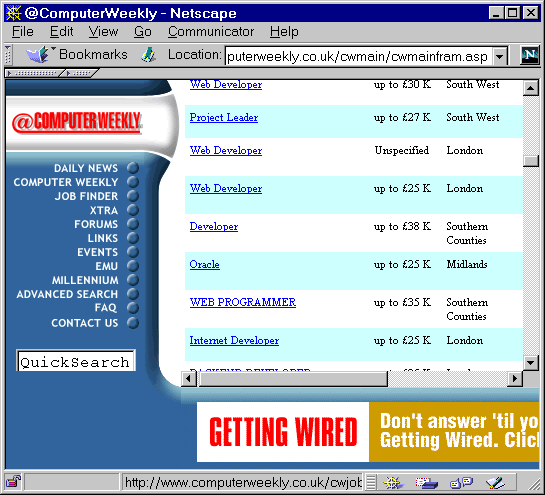
Figure 5 - Computer Weekly’s JobFinder Service
Although not as sophisticated as Computer Weekly’s JobFinder service (which includes the option to save job details to a personalised job folder), the jobs.ac.uk service [38] and NISS’s Vacancies Service [39] are more directly relevant to the UK Higher Education Community.
Finally the Web Developer’s Virtual Libary (WDVL) [40], contains a useful section on web-related jobs [41].
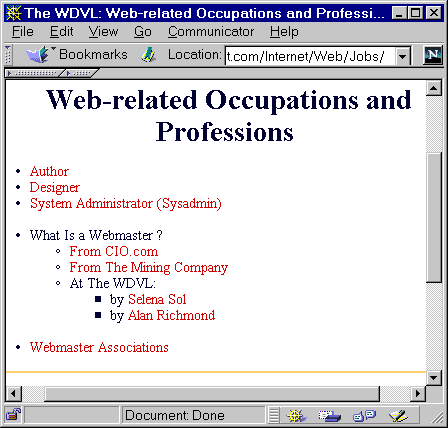
Figure 6 - WDVL Section on Job Resources
Conclusions
What conclusions can be drawn? From the University management perspective there appears to be little consistency in the job titles for staff involved in web management, and a range of salary scales and expectations of the skills required by the post-holder. From the web editor point of view there appear to be a feeling that HTML expertise will diminish in importance (as sophisticated authoring tools become available and back-end databases become more widely deployed to provide access to corporate information). Web editors seem to feel that information management, people and political skills are of great importance. Technical expertise (such as systems management and software development) is important in running institutional web services, but is likely to be provided by others within the organisation.
However, although the importance of information management and political skills may be recogonised by the practisioners themselves, and by a number of web organisations, such as the International Webmasters Association, this does not yet appear to be acknowledged by University management, or, indeed, by the marketplace, with the high salaries going to software developers with scarce technical skills.
The career development (or rather lack of a career structure, which was mentioned in several personal communications) for web editors should be of concern to institutions. The web can’t be both a strategic tool for institutions and a political football, with key personnel being employed on short-term contracts with uncertain futures.
Who can help? Perhaps the AUT’s Computer Staff Committee [42] should have an interest, or the UCISA Staff Development Group (SDG) [43], which currently has projects looking into IT Training Routes to Accreditation / Certification and the European Computer Driving Licence and which runs workshops on communicating with users and management skills, are well-placed to progress the professional development of web editors further? Over to you, UCISA-TLIG Committee [45]!
References
- Report on the "Institutional Web Management" Workshop, Web Focus Corner, Ariadne issue 17
<URL: http://www.ariadne.ac.uk/issue17/web-focus/> - Running An Institutional Web Service, Web Focus Corner, Ariadne issue 11
<URL: http://www.ariadne.ac.uk/issue11/web-focus/> - Trials and Tribulations of a Web Editor, Workshop report
<URL: http://www.ukoln.ac.uk/web-focus/events/workshops/webmaster-jul1997/feedback/workshop-conclusions.html#web-editor> - website-info-mgt, Mailbase list archive
<URL: http://www.mailbase.ac.uk/lists/website-info-mgt/1998-10/0018.html> - Birkbeck College, Institutional home page
<URL: http://www.bbk.ac.uk/> - University of Leeds, Institutional home page
<URL: http://www.leeds.ac.uk/> - Computer Officer (WWW Development), Job advertisement
<URL: http://www.leeds.ac.uk/ucs/vacancies/#wwwco> - Computer Officer (WWW Development) Further details
<URL: http://www.leeds.ac.uk/ucs/vacancies/wwwcojd.htm> - Roehampton Institute, Institutional home page
<URL: http://www.roehampton.ac.uk.com/> - University of Plymouth, Institutional home page
<URL: http://www.plymouth.ac.uk/> - Guy’s & St Thomas’ Hospital Trust, Institutional home page
<URL: http://www.hospital.org.uk/> - Bristol City Council, Institutional home page
<URL: http://www.bristol-city.gov.uk/> - Internet World, Organisational home page
<URL: http://www.internetworld.com> - More Work–But More Money, Internet World, 5 Oct 1998
<URL: http://www.internetworld.com/print/1998/10/05/news/19981005-more.html> - website-info-mgt, Mailbase list archive
<URL: http://www.mailbase.ac.uk/lists/website-info-mgt/1998-10/0010.html> - World Wide Web Organisations, Yahoo web site
<URL: http://www.yahoo.co.uk/Computers_and_Internet/Internet/World_Wide_Web/Organisations/> - The HTML Writers Guild, Organisational home page
<URL: http://www.hwg.org/> - International Webmasters Association, Organisational home page
<URL: http://www.irwa.org/> - Web Specialists Defined, International Webmasters Association
<URL: http://www.iwanet.org/profdevel/specialists.html> - Web Department Staffing Models, International Webmasters Association
<URL: http://www.iwanet.org/profdevel/staffing.html> - Professional Development, International Webmasters Association
<URL: http://www.iwanet.org/profdevel/> - Certified Internet Professional, Novell
<URL: http://www.netboss.com/> - Systems and Software Training Website, Sysoft
<URL: http://NETRA.sysoft.com/web/> - Systems and Software Training Website - Career Roadmap, Sysoft
<URL: http://NETRA.sysoft.com/web/crm.htm> - Hands-On Corporate Webmaster, Sysoft
<URL: http://NETRA.sysoft.com/web/corporate.htm> - WebProfesion Ezine, Organisational home page
<URL: http://www.webprofesion.org/> - The World Organization of Webmasters, Organisational home page
<URL: http://www.world-webmasters.org/> - January Newsletter, WOW
<URL: http://www.naw.org/newsletter/january/> - International United WebMasters Association, Organisational home page
<URL: http://www.iuwa.org/> - IUWA Projects, IUWA
<URL: http://www.iuwa.org/projects.htm> - Webmasters Guild, Organisational home page
<URL: http://www.webmaster.org/> - web-support list, Mailbase list archive
<URL: http://www.mailbase.ac.uk/lists/web-support/> - Association of Internet Professionals, Organisational home page
<URL: http://www.association.org/> - Association of Internet Professionals, Organisational home page
<URL: http://london.uk.association.org/> - CIO, CIO Online home page
<URL: http://www.cio.com/CIO/> - Web Career Research Centre, CIO
<URL: http://www.cio.com/forums/careers/> - @ComputerWeekly, Organisational home page
<URL: http://www.computerweekly.co.uk/cwmain/cwmainfram.asp> - jobs.ac.uk, Organisational home page
<URL: http://jobs.ac.uk/> - Vacancies Service, Organisational home page
<URL: http://www.vacancies.ac.uk/> - The Web Developer’s Virtual Library, Organisational home page
<URL: http://wdvl.internet.com/> - Web-Related Occupations and Professions, Web Developer’s Virtual Library
<URL: http://wdvl.internet.com/Internet/Web/Jobs/> - AUT Committees, AUT
<URL: http://www.aut.org.uk/about/committees.htm#computer> - UCISA SDG, Organisational home page
<URL: http://www.ucisa.ac.uk/SDG/> - UCISA SDG Committee, UCISA SDG
<URL: http://www.ucisa.ac.uk/SDG/uctgact.htm>
Author Details
Brian KellyUK Web Focus
Email: B.Kelly@ukoln.ac.uk
UKOLN: http://www.ukoln.ac.uk/
Tel: 01225 323943
Address: UKOLN, University of Bath, Bath, BA2 7AY
